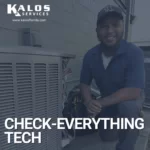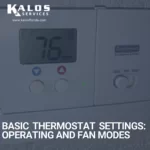With the rise of AI data centers and a need to meet their energy demands, there has been a renewed interest in nuclear power. Florida only has two nuclear power plants in operation, both of which are a good distance south of Central Florida. However, it still pays to know what to do in a release of nuclear contamination, especially if you move to someplace near a power plant. One of the key players in an emergency nuclear response is—you guessed it—the air conditioning!
What We Knew About Air Conditioning in a Nuclear Emergency
The first advice for nuclear emergency responses was issued in the early 2000s. While evacuation remains the best response, it isn’t always possible, so some shelter-in-place (SIP) guidelines were put into place. The official SIP advice was to seal openings (windows, doors, and vents to the outdoors) and turn the air conditioning off entirely.
That seems like reasonable advice! We clearly don’t want contaminated particles to get in through windows or doors. Your A/C also circulates air, so it would make sense that we wouldn’t want to circulate any contamination that may have snuck in.
However, technology, building codes, and our understanding of particle motion have evolved. The U.S. Department of Homeland Security (DHS) has updated its advice to account for this new knowledge.
The NEW Advice
The new advice is a lot more nuanced and doesn’t have a one-size-fits-all approach. New homes in Florida (and we’ve seen a LOT of those lately) are built very tight. Old homes, before air conditioning was a staple, are very loose. We’ll need different approaches to keep nuclear contamination out.
Tight Buildings
For tight buildings, the new advice is to cover doors and windows and turn your air conditioning off until the plume passes. Local radio stations will let you know when that is.
Once the plume passes, the latest advice is to run your air conditioning. If you have fresh air pathways, keep those closed, but you can and should circulate air in the building. Running your air conditioner means you’re filtering the air. While filters won’t catch radiation, they can capture contaminated particles (like pollen).
Loose Buildings
For loose buildings, we’ll still want to avoid running the central air conditioning. Portable units with filters are your safest bet. You can also make DIY filter systems. One way is to duct-tape a filter to a square box fan.

An even better method is to use four filters, duct tape, a square piece of cardboard, and a box fan to create a cube.

HEPA Filtration
As you can see, filtration is one of our best defenses against nuclear contamination. HEPA filters take that to another level.
HEPA filters gained a lot of traction during the COVID-19 pandemic because they could capture the tiny SARS-CoV-2 viruses that many run-of-the-mill filters could not. These filters impede airflow too much to be used as a main filter, but they could be great secondary filters. Below, you can see one of our techs installing a “bypass” HEPA filter box on the side of the main air handler. The idea is that some air goes through the normal filter, and some goes through the HEPA filter, which then ties back into the main ductwork.

However, great as HEPA filters are, they are still NOT 100% effective. Studies have shown that they catch up to 99.97% of particles the size of the SARS-CoV-2 virus and bigger. Some contaminants can be a bit smaller, and the filter won’t do anything against radiation.
In short, if you have a tight home that was built or renovated recently, the new nuclear emergency advice is to wait for the plume to pass and then run the air conditioner. If you have an old, leaky home, do not run the central A/C; focus on portable units and filtration systems.
The entire set of advice and the studies it was based on can be downloaded from the DHS site HERE. It’s dense at times, but it’s an interesting read. It also offers some other good SIP strategies for sealing windows and doors.
And while Kalos can’t stop a nuclear emergency, we can help with HVAC service, installation, and maintenance. We also offer filter upgrades for your home or business. Call or text us anytime at 352-243-7099 to learn more about our residential and commercial HVAC services.






